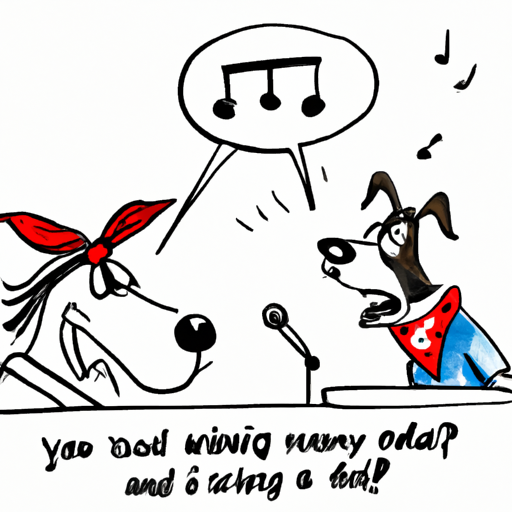Understanding the Canine Communication
Demonic possession? A secret lullaby? Or perhaps your dog just isn’t a fan of your singing voice? Let’s dive into the fascinating world of canine communication to understand why your pooch may howl when you decide to belt out a tune.
Dogs, like their wolf ancestors, are social creatures. They communicate with their pack using a variety of methods, and vocalizing is one of them. Howling is a primal form of communication, a long-distance call to rally the pack, signal danger, or express distress.
Your Singing: Music or a Distress Call?
When you sing, your dog may interpret this as a type of howl. It’s possible that your dog thinks you are calling out for help or trying to communicate something important.
- Frequency and Pitch: High pitched sounds, such as those produced when singing, can trigger a dog’s howling instinct.
- Bonding: Dogs use howling as a bonding exercise with their pack. So, when you sing, your dog may howl to join in and create a sense of camaraderie.
Dogs and Music: More than Meets the Ear
Believe it or not, dogs do have a sense of music. Anecdotally, many dog owners report that their pets have specific preferences when it comes to different types of music, with classical music often being a favorite.
- Relaxation: Certain types of music, like classical, have been shown to reduce stress in dogs.
- Stimulation: On the other hand, discordant sounds and music may cause anxiety or excitement, leading to howling or other vocalizations.
Decoding Your Dog’s Howls
When your dog howls, it’s important to understand what they might be trying to communicate. Here’s a simple table to help you decode their howls:
| Howl Type | Potential Meaning |
|---|---|
| Long, drawn-out howl | Your dog may be lonely or anxious. |
| Short, sharp howl | This could signal excitement or greeting. |
| Rising and falling howl | Your dog might be issuing a warning or expressing distress. |
How to Respond to Your Dog’s Howls
As a caregiver, your instinct is to ensure your pet’s comfort and wellbeing. Therefore, understanding and appropriately responding to your dog’s howling is crucial. Here are some tips:
- Do not punish: Punishing your dog for howling can lead to more anxiety and could increase the behavior.
- Positive reinforcement: If your dog is howling due to anxiety or fear, try to create a positive association with the trigger.
- Consult a professional: If the howling becomes excessive, it may be worth seeking advice from a professional dog trainer or behaviorist.
Frequently Asked Questions
Q: Are certain breeds more likely to howl?
A: Yes, breeds like Huskies and Alaskan Malamutes, which have a closer lineage to wolves, are more likely to howl.
Q: Can my dog’s howling be a sign of illness?
A: While occasional howling is normal, excessive howling could be a sign of physical or mental distress. Consult a vet if you’re concerned.
Q: Should I stop singing if my dog howls?
A: Not necessarily. Your dog might just be joining in. However, if the howling is causing distress, it’s worth consulting a professional.
Let’s hope this article has hit the right note for you, and you’re now more attuned to why your dog may be howling when you sing. Remember, each howl is a note in the harmony of canine communication. So, keep singing, keep listening, and keep building that bond with your four-legged friend.



